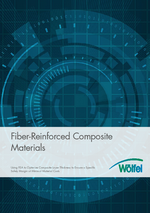Fiber-Reinforced Composite Materials: Using FEA to Optimize Composite Layer Thickness to Ensure a Specific Safety Margin at Minimal Material Costs


The constant effort to improve product quality while at the same time reducing production and material costs has led to more complex designs and to the pushing of their limits. Due to the diverse properties of composite materials, such as being lightweight, durable and resistant to corrosion, they have been employed for a long time in several sectors, for example in the automotive and aerospace industries. Composite materials are, however, more difficult to employ, as their behavior is more complex than those of homogenous materials. In this White Paper, we present a brief explanation of composite materials, their failure modes, and the steps required to model them using the finite element method. In a Case Study about a rotor blade section we show that, after careful analysis, a reduction of the material is possible while maintaining the requirements of the product. The simulation is performed with Dassault Systèmes SIMULIA Abaqus and the Composites Modeler Add-on for Abaqus/CAE.
Composite materials are, however, more difficult to employ, as their behavior is more complex than those of homogenous materials. In this White Paper, we present a brief explanation of composite materials, their failure modes, and the steps required to model them using the finite element method.
In a Case Study about a rotor blade section we show that, after careful analysis, a reduction of the material is possible while maintaining the requirements of the product. The simulation is performed with Dassault Systèmes SIMULIA Abaqus and the Composites Modeler Add-on for Abaqus/CAE.

The constant effort to improve product quality while at the same time reducing production and material costs has led to more complex designs and to the pushing of their limits. Due to the diverse properties of composite materials, such as being lightweight, durable and resistant to corrosion, they have been employed for a long time in several sectors, for example in the automotive and aerospace industries. Composite materials are, however, more difficult to employ, as their behavior is more complex than those of homogenous materials. In this White Paper, we present a brief explanation of composite materials, their failure modes, and the steps required to model them using the finite element method. In a Case Study about a rotor blade section we show that, after careful analysis, a reduction of the material is possible while maintaining the requirements of the product. The simulation is performed with Dassault Systèmes SIMULIA Abaqus and the Composites Modeler Add-on for Abaqus/CAE.
Composite materials are, however, more difficult to employ, as their behavior is more complex than those of homogenous materials. In this White Paper, we present a brief explanation of composite materials, their failure modes, and the steps required to model them using the finite element method.
In a Case Study about a rotor blade section we show that, after careful analysis, a reduction of the material is possible while maintaining the requirements of the product. The simulation is performed with Dassault Systèmes SIMULIA Abaqus and the Composites Modeler Add-on for Abaqus/CAE.
